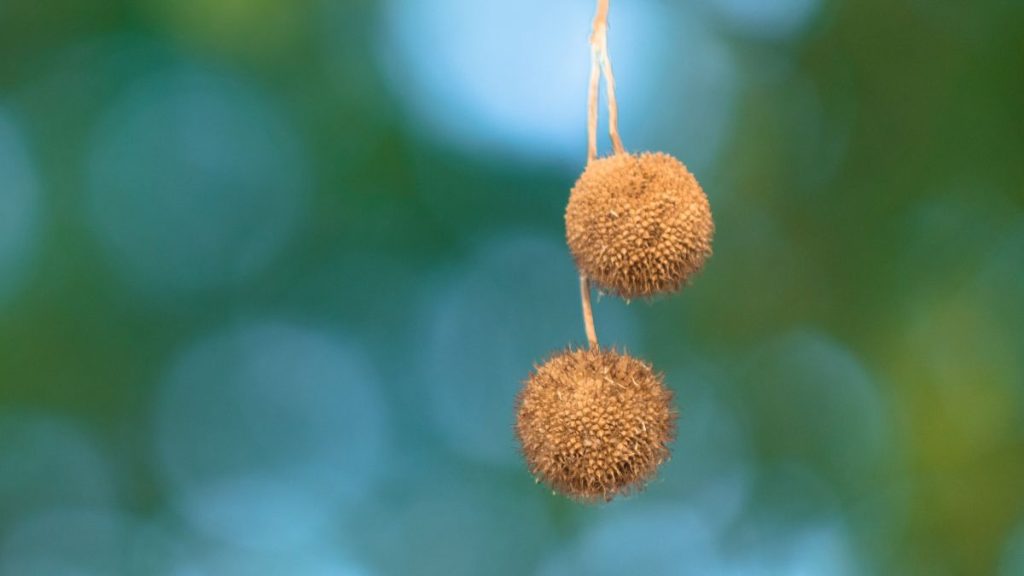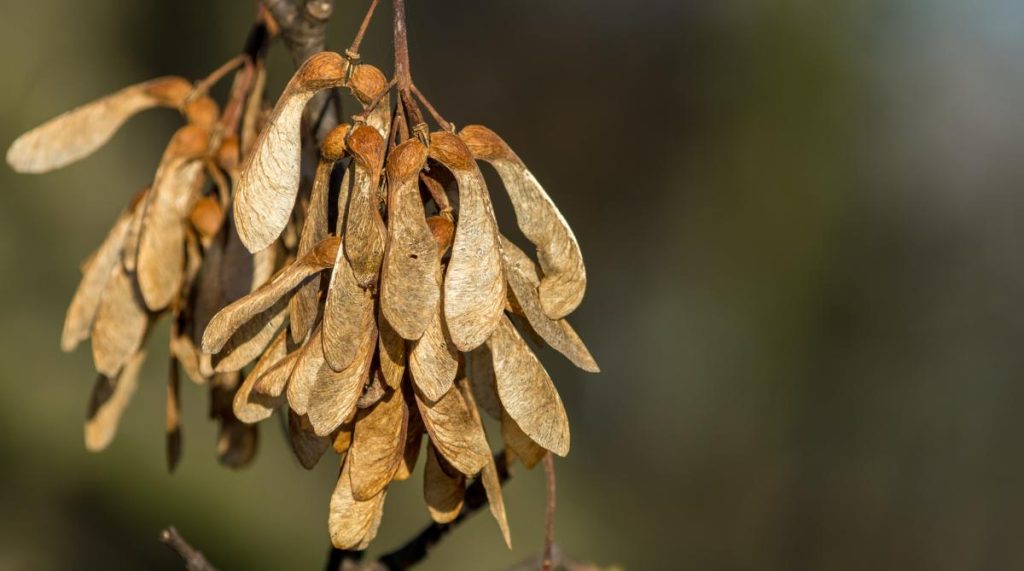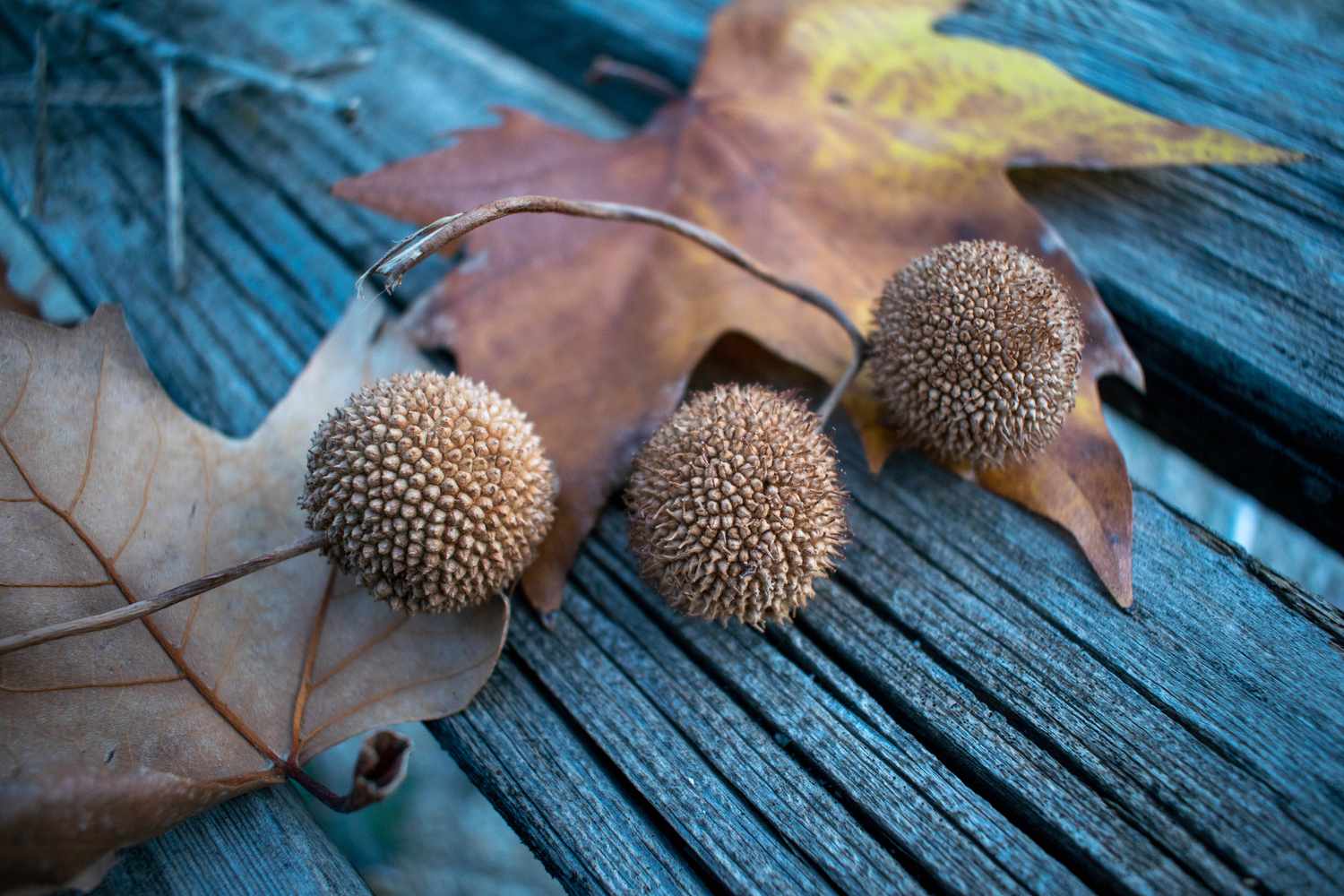No, Sycamore seeds also known as helicopter seeds or samaras are not generally considered harmful to humans. These seeds come from sycamore trees, which are part of the maple family, and they are not typically toxic.
While they are not meant for eating and may cause some digestive discomfort if consumed in large quantities, they are not poisonous. However, it’s always best to avoid eating them. If someone ingests a significant number and experiences problems, it’s a good idea to seek medical help.
Moreover, For farm animals ( (cattle, sheep, and goats) horses, and pets, sycamore seeds and acorns can be harmful. If there’s a concern about poisoning in these animals, it’s crucial to consult a veterinarian promptly.
Characteristics of Sycamore Seeds

Origin: Sycamore seeds come from sycamore trees, which belong to the maple family (Aceraceae). These trees are native to various parts of the world, including North America, Europe, and Asia.
Appearance: They are flat, winged seeds with a unique shape resembling a helicopter rotor or a pair of wings. Also, it has a central seed body with a flattened, elongated wing extending from each side. This winged structure allows them to be carried by the wind over long distances, aiding in seed dispersal.
Size: The size can vary, but they are typically small, with the central seed body measuring around 1-2 centimeters in length and the wings extending further on either side.
Edibility: Further, they are not intended for human consumption and are not considered a food source. They are typically found on it and are not cultivated or consumed as a part of the human diet.
Palatability: Sycamore seeds are generally not palatable to humans. They are not commonly eaten due to their bitter taste and the fact that they are not considered a food item.
Seed Dispersal: Their winged structure allows them to be carried by the wind, and as they fall from the tree, they can spin or “helicopter” down to the ground. This aerodynamic design aids in seed dispersal and helps the seeds to be spread over a wide area.
Use in Nature: In their natural environment, sycamore seeds play a vital role in the reproduction and dispersal of sycamore trees, helping to establish new trees in different locations.
Potential Effects On Humans After Eating Sycamore Seeds
Ingesting Small Quantities:
- Eating a few sycamore seeds won’t harm you. They are generally safe in small amounts and shouldn’t cause any problems.
Ingesting Large Quantities:
- Consuming a significant amount of them, while not toxic, may lead to digestive discomfort. This discomfort can include symptoms such as nausea, bloating, or stomach upset.
- Large quantities can be challenging to digest due to their fibrous nature and may lead to temporary gastrointestinal discomfort.
Adverse Effects:
- While they are not toxic, if you ever eat a ton of them and feel really unwell or have unusual symptoms, it’s a good idea to see a doctor just to be sure.
Comparing Sycamore Seeds to Other Toxic Seeds
| Seed Type | Toxicity Level to Humans | Major Toxic Compounds | Potential Effects |
| Sycamore Seeds | Low to Moderate | Minimal harmful compounds | Digestive discomfort in large quantities |
| Castor Bean Seeds | Extremely High | Ricin (lethal in small amounts) | Severe symptoms, potentially fatal if ingested |
| Oleander Seeds | Extremely High | Oleandrin and Nerioside | Nausea, vomiting, heart arrhythmias, and death |
| Rosary Pea Seeds | Extremely High | Abrin (more toxic than ricin) | Lethal even in small quantities if ingested |
| Apple Seeds | Low to Moderate | Cyanogenic compounds | Release of cyanide in large quantities if ingested |
Are sycamore seeds harmful to donkeys and horses?
Yes, they can be dangerous. There’s a condition called Atypical Myopathy (sycamore poisoning) that can seriously affect donkeys and horses when they eat sycamore seeds or seedlings. It can make them very sick and, sadly, some animals can even die from it.
The signs of sycamore poisoning in donkeys and horses are muscle problems, tiredness, and dark red or brown urine. It can happen suddenly, and sometimes healthy animals can be found dead the next day.
This doesn’t happen all the time, but it’s good to be careful, especially in the autumn when sycamore seeds are around, and in the spring when there are sycamore seedlings. If your animals are in a field with not much else to eat, you should watch out.
The thing that makes sycamore seeds harmful is a substance called Hypoglycin A (HGA). In 2022, the seeds were even more toxic because of a long drought. But it’s not the same for every sycamore tree – some are more dangerous than others. So, it’s a good idea to be careful and try to keep your animals away from sycamore seeds.
How many sycamore seeds can harm a horse or a donkey?
It’s as few as 50 seeds, and little mini horses and donkeys are extra vulnerable. The same problem can happen with oak trees and acorns, but more people know about that.
To protect your animals, here’s what you can do:
- Put up fences around sycamore trees in the fall so the seeds stay in one place.
- If you can, use a leaf vacuum to clean up the helicopter seeds. It’s best to burn them.
- If you don’t have a leaf vacuum, regularly rake up the seeds and get rid of them.
- Pick up any leftover seeds by hand. They are easy to miss, so be thorough.
- Check the water buckets and troughs for seeds because the toxins can get into the water.
- Give your horses or donkeys extra food if they don’t have much to eat in their area. This makes them less likely to eat stray seeds.
- In the spring, watch for seedlings and pull them up when they pop up.
- Keep an eye out in the fall and spring for any signs that your animals might be sick from sycamore seeds. If they look like they have a tummy ache, or muscle problems, seem tired, or keep their heads down, call the vet right away and get your animals out of that area.
Signs of Sycamore Sickness in Horses Made Easy

When horses get sick from sycamore seeds, it’s because of a toxin called HGA. This toxin messes with the muscles in their body, including the ones for moving and their heart. Different horses can get sick in different ways, with some horses affected more than others.
Here are the common signs of sycamore sickness in horses:
- They feel weak and might struggle to walk, stand, or breathe.
- move around stiffly.
- may lie down more than usual and look sad.
- head can hang low and get swollen if they keep it down for a long time.
- might have shaky muscles and start sweating.
- heart and breathing go faster.
- heartbeat may become irregular in some cases but not in others.
- Some horses can have tummy pain (colic).
- Their eating habits can change; some might not want to eat, while others get really hungry.
- Also, might feel pain and discomfort when they pee.
- urine can turn dark in color.
Horses that can stay on their feet, keep eating, pooping, and peeing and have a lower resting heart rate during treatment have a better chance of getting better. Unfortunately, there is no specific treatment for sycamore sickness because there is no antidote for the toxin. So, the vet focuses on treating the signs the horse shows.
FAQ’s
Are sycamore seeds poisonous?
Sycamore seeds are not typically considered poisonous to humans. However, they can be harmful to certain animals like horses and pets.
Are sycamore balls poisonous to humans?
Yes, the spiky seed-pods of sycamore trees are poisonous for humans to consume.
Can a sycamore tree make you sick?
Yes, Some people may have allergies to sycamore trees, which can lead to symptoms like sneezing, nasal congestion, and a runny nose.
Can I eat sycamore fruit?
Yes, The sycamore fig’s fruit is edible, but it’s not related to the American sycamore tree commonly found in the United States.
How toxic are sycamore?
Sycamore seeds contain Hypoglycin, which is toxic to horses and can cause severe muscle and heart issues even with a small amount consumed.
Which sycamores are poisonous?
Atypical myopathy (or ‘sycamore poisoning’) can occur when horses eat sycamore ‘helicopter’ seeds, sycamore leaves, or seedlings in the pasture during certain seasons.
Are dried sycamore leaves poisonous?
Yes, dried sycamore leaves and helicopter seeds are poisonous to horses, containing a toxin called Hypoglycin A (HGA).
. How long are sycamore seeds poisonous?
Sycamore seeds and seedlings can remain toxic for six to eight months, even if they are stored in bales.
Is sycamore wood toxic?
No, Sycamore wood is generally non-toxic and does not pose significant health risks. Handling or consuming it is considered safe.
What kills sycamore seeds?
Herbicides like Envy and Grazon can be used to control sycamore seeds. Recommended application rates vary depending on the method of application.
How do you treat sycamore poisoning?
The treatment for sycamore poisoning in horses involves giving fluids, anti-inflammatory drugs, and supportive care as soon as possible. However, sycamore poisoning is commonly fatal due to the amount of HGA (Hypoglycin A) consumed. Prevention by avoiding the toxin in leaves and helicopter seeds is essential.
Are sycamore trees medicinal?
Yes, Sycamore trees have been used for various medicinal purposes by Native Americans, including remedies for colds, coughs, dietary needs, dermatological treatments, and aid for respiratory, gynecological, and gastrointestinal issues.
What is sycamore seed used for?
Native Americans have used sycamore seeds for medicinal purposes, including treatments for colds, coughs, dietary needs, dermatological issues, and assistance with respiratory, gynecological, and gastrointestinal ailments.
What does sycamore seed give to the body?
Sycamore seeds are rich sources of essential minerals such as phosphorus, magnesium, calcium, and iron, which are important for the health and maintenance of the body.
Final Word
To sum up, sycamore seeds, also known as helicopter seeds or samaras, are generally not considered poisonous to humans. Ingesting a small quantity is unlikely to cause harm, and while larger quantities may lead to digestive discomfort, they are not toxic.
However, it’s crucial to avoid consuming sycamore seeds as they are not intended for human consumption. If someone ingests a significant amount and experiences adverse effects, seeking medical advice is advisable.
Moreover, it’s essential to be aware that sycamore seeds can be harmful to certain animals, such as farm animals, horses, and pets, and preventative measures should be taken to protect them from potential poisoning.











